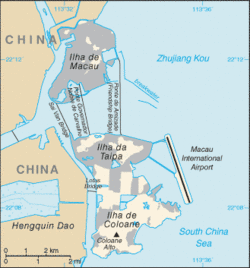|
|
MacaoFrom Researching Virtual Initiatives in Educationby Paul Bacsich for Re.ViCa For entities in Macao see Category:Macao
Partners situated in MacaoNone.
Macao in a nutshellMacao - the Macau Special Administrative Region, (Traditional Chinese: 澳門特別行政區, Simplified Chinese: 澳门特别行政区, Cantonese Yale: O Mun Dak Bit Hang Jeng Kui), commonly known as Macau or Macao (traditional Chinese: 澳門; simplified Chinese: 澳门; pinyin: Aòmén; Jyutping: ou3 mun4), is one of the two special administrative regions of the People's Republic of China, the other being Hong Kong. Macao lies on the western side of the Pearl River Delta, bordering Guangdong province in the north and facing the South China Sea in the east and south. The territory has thriving industries such as textiles, electronics and toys, and a notable tourist industry that boasts a wide range of hotels, resorts, stadiums, restaurants and casinos. This makes it one of the richest cities in the world. Its population is 520,400 (2007 figure). Macao was both the first and the last European colony in China. Portuguese traders first settled in Macau in the 16th century and subsequently administered the region until the handover on December 20, 1999. The Sino-Portuguese Joint Declaration and the Basic Law of Macau stipulate that Macau operates with a high degree of autonomy until at least 2049, fifty years after the transfer. Under the policy of "one country, two systems", the Central People's Government is responsible for the territory's defense and foreign affairs, while Macao maintains its own legal system, police force, monetary system, customs policy, immigration policy, and delegates to international organisations and events. Macao education policySchools in MacaoA fifteen-year free education is currently being offered to residents: that includes a three-year kindergarten, followed by a six-year primary education and a six-year secondary education. The literacy rate of the territory is "only" 93.5%. The illiterates are mainly among the senior residents aged 65 or above; the younger generation, for example the population aged 15–29, has a literacy rate of above 99%. Currently, there is only one school in Macau where Portuguese is the medium of instruction. Macau does not have its own universal education system; non-tertiary schools follow either the British, the Chinese, or the Portuguese education system. The majority of the schools in Macau are so-called "grammar schools", which offer language learning, mathematics, science subjects, social studies, etc. to the students. There are only a few vocational schools in Macau, offering technical subjects such as car repairing, electronics, electrical engineering, etc. In 2006, PISA (the Programme for International Student Assessment, a world-wide test of 15-year-old schoolchildren's scholastic performance coordinated by OECD) ranked Macau as the fifth and sixth in science and problem solving respectively. For more details see http://en.wikipedia.org/wiki/Education_in_Macau. Nevertheless, education levels in Macau are low among high income regions. According to the 2006 by-census, among the resident population aged 14 and above, only 51.8% has a secondary education and 12.6% has a tertiary education. As prescribed by the Basic Law of Macau Chapter VI Article 121, "the Government of Macau shall, on its own, formulate policies on education, including policies regarding the educational system and its administration, the language of instruction, the allocation of funds, the examination system, the recognition of educational qualifications and the system of academic awards so as to promote educational development. The government shall also in accordance with law, gradually institute a compulsory education system. Community organisations and individuals may, in accordance with law, run educational undertakings of various kinds."
Higher educationThere are currently 10 tertiary educational institutions in the region, four of them being public. There is a total number of 1,500 academic staff and there are about 27,000 registered students.
Universities in MacaoThe following is a list of universities, polytechnics and other advanced level (higher) education and research institutions in Macau.
Polytechnics in MacaoThe following appear to be of polytechnic status:
Education reformThe Bologna ProcessThere are close links between universities in Macao and those in Portugal.
Administration and financeQuality assuranceInformation societyTowards the information societyInformation society strategyVirtual initiativesInteresting Virtual Campus InitiativesAsia International Open UniversityAsia International Open University (AIOU) is an open university approved by the Government of Macao. It is a member of the International Council for Educational Media (ICEM) and the Associacao das Universidades de Lingua Portuguese (AULP). Its web site is at http://www.aiou.edu/eng/index_e.htm A collaboration agreement was signed between the University and the British Columbia Open University of Canada to enable Macau and Hong Kong students to earn a Bachelor of Business Administration degree with Canadian credential. The University has been actively organizing and participating in different international academic conferences. The University always maintains close cooperation with institutions of higher education in China. In 1993, the University established the East Asia International Institute in Shanghai offering a wide range of high level business studies programs that were highly valued by both the community and the authorities. In 1997, agreement was signed with Shanghai Television University (the pioneer of distant learning in China) to establish a sister-institution relationship. The University has launched several high level Business Administration programs in different parts of Mainland China in conjunction with Mainland institutions. On the other hand, in response to the demand in Hong Kong and Macau on the knowledge of China trade and China law, the University has launched various Diploma programs on China law, China finance/banking, China finance/accounting, China trade and China public administration to the community. Currently, the University is developing a series of e-learning programs. Interesting ProgrammesRe.ViCa Case-studyNone.
Lessons learntReferences(try to add one or two) |
